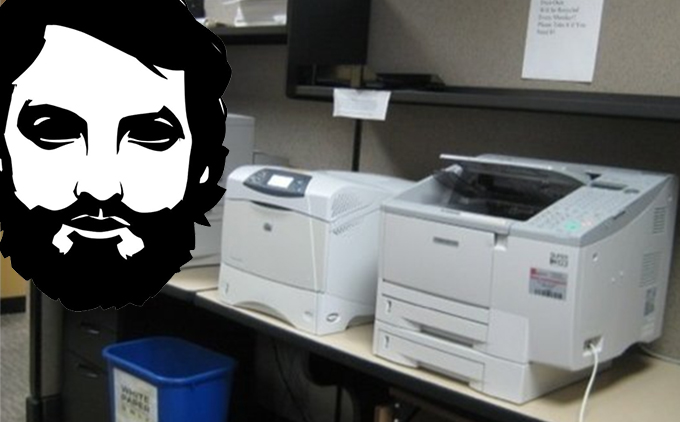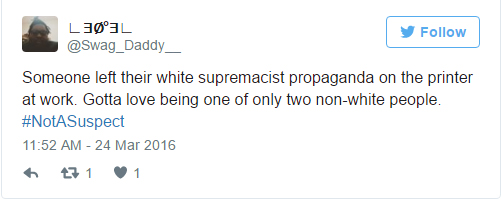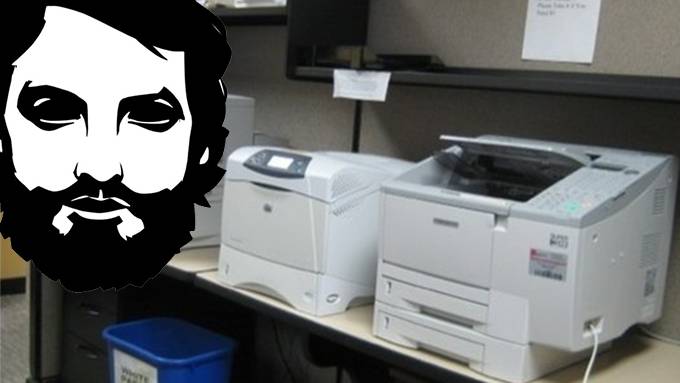Weev Hacks College Campus Printers Stating "The Struggle for Global White Supremacy"
Source: nytimes.com

A well-known computer hacker who goes by the name of “Weev” said he was behind a wave of anti-Semitic, racist fliers that appeared on printers at more than a dozen college campuses last week.
Covered in swastikas, the fliers, which seemed to appear spontaneously on printers, including those at Princeton University, mentioned “the struggle for global white supremacy.”
Weev is the alias of Andrew Auernheimer, who in 2010 was part of a group of hackers that discovered a security loophole on AT&T’s servers and gained access to the data of 114,000 customers. Mr. Auernheimer was initially convicted of identity fraud and conspiracy to access a computer without authorization, but his conviction was overturned on appeal.
Mr. Auernheimer said in an interview on Monday that he sent the fliers to every publicly accessible printer in North America. He said he did not specifically target college campuses.
The fliers directed readers to The Daily Stormer, a neo-Nazi website. Mr. Auernheimer said free speech concerns were behind his printing spree. “My motivation is this: White cultures and only white cultures are subject to an invasion of foreigners.”
The debate comes at a time of heightened awareness about speech on campus. Black student movements at many campuses broke out this school year, protesting what students saw as the continuing legacies of racism. Last week, the University of California became the first public university system to adopt an official stance condemning anti-Semitism on their campuses.
After the fliers appeared on Princeton University printers, the administration promised to try to “block any further messages.”
Andrew Auernheimer was part of a group that in 2010 gained access to the data of 114,000 AT&T customers through a security loophole. Julio Cortez/Associated Press
Some leaders of the black protests here said they saw a discrepancy between the university’s response to the fliers and what they saw as racism against black students in the past.
Almost a year ago, after Urban Congo, a student percussion group, performed on campus in loin cloths, which many on campus found offensive, the university’s president, Christopher L. Eisgruber, sent an email to the student body that affirmed the school’s commitment to free speech.
He reiterated that on a trip to India last week, when he told the Indian Express, “We think it’s very important for people be able to say what it is they want to say even if it’s offensive to the government or offensive to some of the other people on campus.”
Asanni York, a member of the Black Justice League, an activist group that led a sit-in in November that called for the removal of President Woodrow Wilson’s name from the campus because of his racist positions, said the university’s response to the fliers differed from past stances. “When it was happening to black students, it was a matter of free speech,” he said. “Now that it’s happening to white, Jewish students, it’s something else. There seems to be no conflation of hate speech and free speech now.”
A Princeton spokeswoman, Min Pullan, said the fliers were not a question of free speech. “External messages infiltrating our campus is a completely different matter. They are not two things that can be compared,” Ms. Pullan said.
In addition to Princeton, the messages appeared at the University of California, Berkeley; Smith College; Brown University; the University of Massachusetts, Amherst; and Mount Holyoke College, among other places.
Many university printers allow printing from outside their computer networks. Mr. Auernheimer said he did not hack into the printers, but activated them using remote access.
In response to the fliers, universities have notified the police and begun to conduct investigations, but it was unclear if Mr. Auernheimer broke any laws. DePaul University in Chicago, for instance, has turned off remote printing.
On Monday morning, anti-gay and transgender fliers appeared on printers at the University of California, Berkeley, and the University of Massachusetts, Amherst. Mr. Auernheimer said he was not involved with them.
Source: nytimes.com
...
A brief experiment in printing
By Andrew "weev" Auernheimer | storify.com
There's a bunch of bright minds in Daily Stormer's new IRC channel and I wanted to take a little time out of my day to show them how easy it is to make the world move with as little as a bash one-liner. I have used bash one-liners to do a lot of things, like shift the market cap of publicly traded corporations by the billions. The key to making impact in the world is not being the smartest or knowing the most. It's about operating asymmetrically at scale. Expend the least amount of effort for the most amount of things happening.
In our chat I asked aloud a simple question: how many printers are there on the open Internet? I wasn't sure of the answer at the time. It turned out to be upwards of a million devices. That's a lot of things to print to. The sheer volume of paper one can generate with a single command is impressive. An average pulping tree produces 8330 sheets of paper. That is a very small fraction of the number of devices we can print to on the public internet.
I thus embark upon a quest to deliver emotionally compelling content to other people's printers. After a little investigation it seemed that to print to a printer with port 9100 exposed, all you have to do is netcat a postscript file to that port.
This is the loop to do that to a whole lot of printers:
#!/bin/bash
for i in `cat printers`
do
cat payload.ps |netcat -q 0 $i 9100
done
I elected one of the Daily Stormer crew to make some postscript for us to push to printers. The final postscript draft rendered to this:

Everything in the postscript we used was actual characters (there is, of course, a unicode swastika character). If we started rendering bitmaps it would make the postscript significantly more complex. When you're printing on the scale of tens or hundreds of thousands of printers, every increase in complexity makes more printers reject the message. With scale you should prefer elegance over complexity, and what could possibly be more elegant than the inherent beauty of the swastika?
Now all I needed was hosts with port 9100 open. For this I fired up masscan, but any of you so inclined could accomplish this easier with a little bit of money if you use Shodan instead. I am dirt Eastern European poor but have rootshells at carrier hotels, so I opted for masscan.
I fired up my shell script and went about my business for the day. After a bit I checked up on this and noticed that every once in a while a netcat had a tendency to hang, so I made another loop to clean up stale old netcats:
while true; do killall --older-than 1m netcat;sleep 1;done
After that it ran quite smoothly. I wasn't even convinced this was working at all until the tweets started coming in.

Brah, I came out of the fucking womb emboldened. I have a red beard and I fight giants. I honor Þor, motherfucker.

LIBERALS AND DARKIES ON A WITCH HUNT FOR THE EVIL OFFICE RACIST LOL. Nothing will redpill white men faster than this.

...
Read the rest: storify.com






















